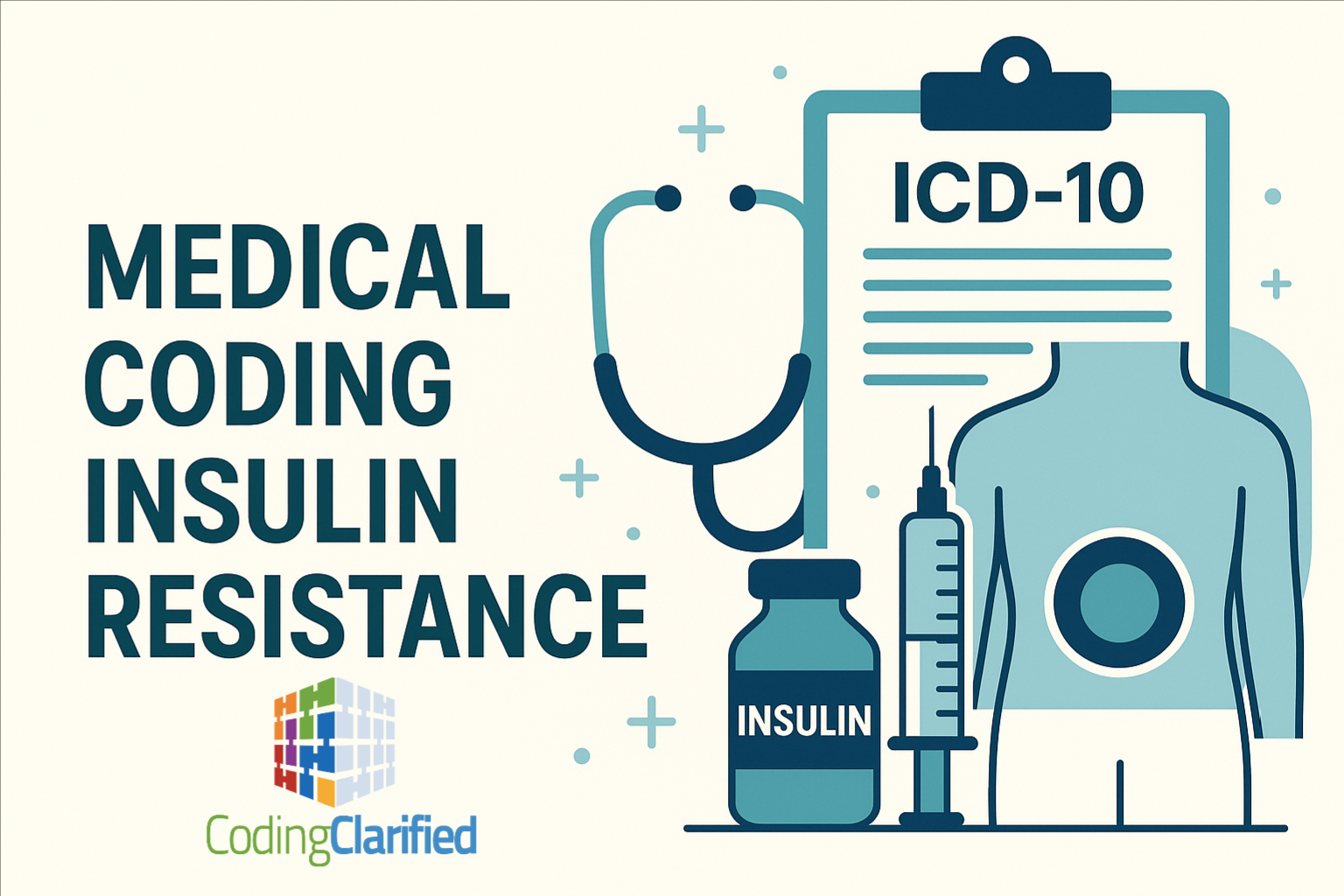Medical Coding Guidelines for Insulin Resistance: What Coders Need to Know
Insulin resistance is a common metabolic condition that often precedes or accompanies more serious health issues such as type 2 diabetes, polycystic ovary syndrome (PCOS), and metabolic syndrome. Though it is a medically significant condition, coding and billing for insulin resistance requires careful attention to documentation and current ICD-10-CM guidelines.
This blog outlines how to accurately code and bill for insulin resistance and associated services.
Diabetes https://codingclarified.com/medical-coding-diabetes/
What Is Insulin Resistance?
Insulin resistance occurs when the body’s cells do not respond properly to insulin, a hormone that helps regulate blood sugar. This leads to elevated blood glucose levels and increased insulin production by the pancreas. Over time, it can contribute to prediabetes, type 2 diabetes, and other complications.
Is There a Specific ICD-10 Code for Insulin Resistance?
ICD-10-CM has no dedicated code for “insulin resistance” as a standalone diagnosis. However, coders can use alternative options based on the clinical context and physician documentation.
Common ICD-10 Codes Used With Insulin Resistance
-
E88.81 – Metabolic syndrome
-
Often used when insulin resistance is part of a broader metabolic disorder.
-
Documentation should clearly link the condition to metabolic syndrome.
-
-
E28.2 – Polycystic ovarian syndrome (PCOS)
-
Use when insulin resistance is associated with PCOS.
-
Make sure PCOS is documented as the primary diagnosis.
-
PCOS https://codingclarified.com/medical-coding-polycystic-ovary-syndrome-pcos/
-
R73.03 – Prediabetes
-
If insulin resistance is documented along with impaired glucose metabolism, prediabetes may be coded.
-
-
Z13.1 – Encounter for screening for diabetes mellitus
-
Use for routine screening visits where insulin resistance is suspected but not diagnosed.
-
Note: Do not code insulin resistance alone unless it’s clearly documented as part of another diagnosable condition. Always follow the provider’s documentation and clinical findings.
CPT Codes for Billing Related Services
If the provider performs specific tests or counseling related to insulin resistance, the following CPT® codes may apply:
-
82947 – Glucose; quantitative, blood (except reagent strip)
-
84443 – Thyroid-stimulating hormone (TSH)
-
80061 – Lipid panel
-
83036 – Hemoglobin A1c
-
99401–99404 – Preventive medicine counseling (e.g., nutritional counseling for insulin resistance)
-
97802–97804 – Medical nutrition therapy (when performed by a registered dietitian)
Important Coding & Billing Tips
-
Thorough Documentation Is Essential
-
Providers must clearly document the clinical relevance of insulin resistance (e.g., as part of metabolic syndrome, PCOS, or prediabetes).
-
Vague mentions like “rule out insulin resistance” should not be coded as definitive diagnoses.
-
-
Avoid Upcoding
-
Don’t use diabetes codes (e.g., E11.9) unless the provider has confirmed the diagnosis. Insulin resistance is not the same as diabetes.
-
Upcoding https://codingclarified.com/medical-coding-bundling-and-upcoding-guidelines/
-
Link Diagnosis to Services
-
Ensure that diagnostic tests and treatments are appropriately linked to a medically necessary diagnosis code on the claim form.
-
Signs and Symptoms https://codingclarified.com/medical-coding-signs-symptoms-in-diseases/
Casual Relationships https://codingclarified.com/medical-coding-and-casual-relationships/
-
Insurance Coverage May Vary
-
Some payers may not cover testing or services unless insulin resistance is tied to a recognized condition (e.g., PCOS or metabolic syndrome).
-
While insulin resistance does not yet have its own standalone code in ICD-10-CM, accurate coding is still possible by linking it to associated conditions when properly documented. Coders should stay up to date with evolving coding guidelines and ensure medical necessity is supported to reduce claim denials and ensure compliant billing.

